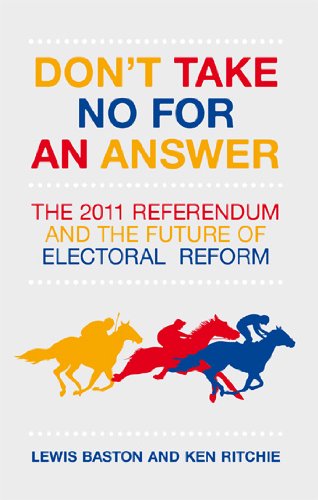Don’t Take No For an Answer: Lewis Baston and Ken Ritchie on the AV referendum
 The May 2011 electoral reform referendum is not a happy memory for Britain’s electoral reformers, which makes this book from two long-standing electoral reform campaigners surprisingly positive. As the title indicates, their view is that the overwhelming No vote does not signal the death of electoral reform in the UK.
The May 2011 electoral reform referendum is not a happy memory for Britain’s electoral reformers, which makes this book from two long-standing electoral reform campaigners surprisingly positive. As the title indicates, their view is that the overwhelming No vote does not signal the death of electoral reform in the UK.
In part the optimism comes from the gory details it gives of the appalling mistakes and mismanagement in the referendum Yes campaign. This was not a superbly organised push for electoral reform that got defeated; the weakness of the campaign gives some hope for a future if, as the authors express the hope, the book helps people learn from the mistakes made.
As Baston and Ritchie point out, the government’s plans for Lords reform include proportional representation, which may yet mean that half of Parliament gets PR within a few years. Moreover, whilst the idea of elected Police Commissioners is controversial, the provision for them to be elected by something other than First Past The Post has gone with barely a murmur of protest – and the only protests there have been about the electoral system are not about the decision to avoid First Past The Post but about the particular alternative chosen (the Supplementary Vote rather than the Alternative Vote).
Lewis Baston and Ken Ritchie are (rightly) very critical of the Yes campaign, which makes their lack of criticism of other, earlier electoral reform campaigning a little surprising. The book has no mention, for example, of how badly many Liberal Democrats reacted to the “fill up their email inboxes” campaign activity launched immediately after the 2010 general election even though it was supposedly aimed at persuading them. That is a shame because it means the question of whether the failure of the Yes campaign was just a 2010/11 failure or something that reflected deeper flaws in the electoral reform movement does not get much attention, though it is hinted at when the authors talk of “an appearance of smugness and self-satisfaction with the ‘democracy sector’ in general needs to lose rather than advertise to the electorate”.
What does get addressed is a good, short narrative of the referendum campaign along with a comprehensive summary of the poll data and voting figures, even if the statistical analysis is a little simple at times. (Questions of link between level of Yes votes and demography, for example, call out for some more advanced statistical calculations than those in the book.)
Overall it is a pretty fair account. Baston’s frequently made criticisms of Nick Clegg over electoral reform are repeated in the book but a fair hearing is also given, for example, to the reasons why in advance of the referendum many Yes campaigners thought May 2011 was a good date to pick; a view that in hindsight not many are keen to defend. The book also does a good job of citing a wide range of different viewpoints within parties and not being confined to a few familiar faces from within the Parliamentary bubble. It even quotes a blog post from myself…
All in all, it is a good guide not only to what went wrong with the AV referendum but also the circumstances in which future referendums might be won or lost. It even paints a few plausible scenarios in which the next referendum may not be that far away – such as if the government does legislate to give petitions with large numbers of signatures a real legislative weight or if a future hung Parliament sees Labour courting Liberal Democrat MPs.
You can buy Don’t Take No For An Answer by Lewis Baston and Ken Ritchie here.
A review of the AV referendum book from @markpack http://t.co/CI9zvAnD – thank you for a fair and reasonable review